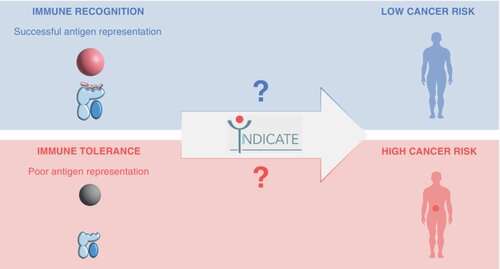Collaborative initiative to unravel the role of HLA in individuals with a genetic cancer predisposition

Scientists from the Heidelberg Institute for Theoretical Studies (HITS), the German Cancer Research Center (DKFZ), the Heidelberg University Hospital and Heidelberg University have established INDICATE, an international collaborative initiative to unravel the role of the Human Leukocyte Antigen type as risk modifier in individuals with a genetic cancer predisposition.
Genetic cancer predisposition is the most important measurable risk factor for cancer at a young age, and individuals affected by it require specialized medical care directed at prevention. The most common inherited cancer predisposition is the so-called Lynch syndrome, which affects approximately 400,000 individuals in Germany and 3.5 million individuals in Europe; carriers have a substantially elevated risk of developing tumors of the large bowel and, in women, the uterus, early in life. However, cancer risk varies widely (30–80%) among individuals even within one family.
"More precise cancer risk estimates would enable a personalized approach to cancer prevention in Lynch syndrome and beyond," says Aysel Ahadova, tumor biologist and local project coordinator of INDICATE. Matthias Kloor, project leader of INDICATE, adds, "One crucial characteristic of Lynch tumors is the induction of a strong anti-tumor immune response. The key link in the process of tumor cell recognition by the immune system are Human Leukocyte Antigen (HLA) molecules."
In a previous study, a team of interdisciplinary scientists from Applied Tumor Biology (ATB, Heidelberg University Hospital and the DKFZ), and the Data Mining and Uncertainty Quantification (DMQ) group at HITS had shown that the HLA type can influence the potential of the immune system to eliminate cancer cells (Ballhausen et al, Nature Communications 2020). In a second step, they aim to examine whether this influence could be reflected in the individual cancer risk of Lynch syndrome carriers.
"The associations of certain HLA types with disease susceptibility have been shown for virus infections, however, in cancer this aspect is poorly understood. Lynch syndrome is an ideal model to address this question for the first time in a systematic manner," says Vincent Heuveline, group leader of DMQ.
"For a systematic analysis, the use of data analysis and mathematical modeling will be key to quantify the influence of the HLA type on cancer risk," adds Saskia Haupt, mathematician and coordinator of the mathematical modeling in INDICATE.
To explore the role of the HLA type in defining Lynch syndrome carriers' cancer risk, the scientists initiated an international collaborative study with the central coordination in Heidelberg (INDICATE, Individual Cancer risk by HLA Type, indicate-lynch.org). Together with their partner institutions—the University Hospital Bonn, Germany, and expert centers from the United Kingdom, Finland, the Netherlands, Norway, and Hungary—they published a paper in the International Journal of Cancer, describing the interplay between the HLA system and human disease susceptibility and announcing the launch of INDICATE.
In parallel, the scientists published a report in HLA about the development of a robust method for detecting specific HLA alleles in archival tissue specimens, making archival and possibly even historic samples accessible for HLA studies. The researchers are now looking forward to shedding light on the HLA-dependent cancer risk in Lynch syndrome and establishing a pipeline for future projects on cancer susceptibilities by HLA type.
More information: Aysel Ahadova et al, Is HLA type a possible cancer risk modifier in Lynch syndrome? International Journal of Cancer (2022). DOI: 10.1002/ijc.34312
Johannes Witt et al, A simple approach for detecting HLA‐A *02 alleles in archival formalin‐fixed paraffin‐embedded tissue samples and an application example for studying cancer immunoediting, HLA (2022). DOI: 10.1111/tan.14846





















